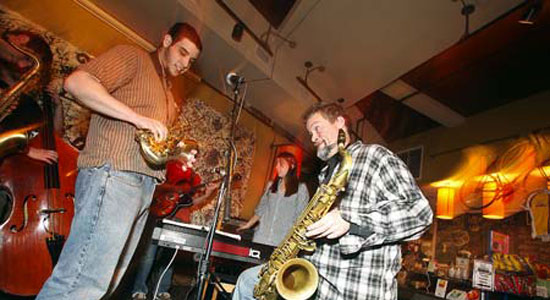As 2011 comes to an end, we are taking a look back at some of our favorite posts of the year by our guest editors.
 You might know award-winning critic/journalist Tom Moon from his bestselling book 1,000 Recordings To Hear Before You Die, his contributions to NPR’s All Things Considered or his freelance work in the likes of Rolling Stone, GQ, Blender, Spin and Vibe, but around the MAGNET office, when we think of Moon, we think of the nearly two decades he spent as the music critic of our hometown newspaper, the Philadelphia Inquirer. When you regularly read a writer’s work for that long, you feel like you really get a sense of who someone is, so we were shocked to find out that Moon is also a musician who just made an album. Into The Ojalá (Frosty Cordial) is credited to Moon Hotel Lounge Project and came out earlier this month. MHLP is an impressive, instrumental, jazz/lounge/Latin-leaning project featuring Moon and six local musicians playing nine Moon-penned tunes as well as a cover of gospel standard “Rock Of Ages.” We are excited to have Moon guest editing magnetmagazine.com all week. Read our new Q&A with him.
You might know award-winning critic/journalist Tom Moon from his bestselling book 1,000 Recordings To Hear Before You Die, his contributions to NPR’s All Things Considered or his freelance work in the likes of Rolling Stone, GQ, Blender, Spin and Vibe, but around the MAGNET office, when we think of Moon, we think of the nearly two decades he spent as the music critic of our hometown newspaper, the Philadelphia Inquirer. When you regularly read a writer’s work for that long, you feel like you really get a sense of who someone is, so we were shocked to find out that Moon is also a musician who just made an album. Into The Ojalá (Frosty Cordial) is credited to Moon Hotel Lounge Project and came out earlier this month. MHLP is an impressive, instrumental, jazz/lounge/Latin-leaning project featuring Moon and six local musicians playing nine Moon-penned tunes as well as a cover of gospel standard “Rock Of Ages.” We are excited to have Moon guest editing magnetmagazine.com all week. Read our new Q&A with him.

Moon: I never stopped studying music, and for many years during my tenure as a critic for newspapers and magazines, I’d sneak an hour of practice time on the horn whenever possible. So in the wake of the great media implosion of 2009, when I found myself in the unaccustomed position of having expanses of time for music, I didn’t have to overcome multiple layers of rust. Just a few. But as I quickly rediscovered, a basic technical facility is really just Level One. The act of exploring music with people, particularly improvised music, requires a whole bunch of other skills: a highly sensitized ear, a deep memory, a willingness to shift gears and be silent long enough for some magic to develop. And on and on. (Here might be time to offer an aside to all those musicians who drifted into day jobs to support the family: Try to maintain contact with music! Trust me, it can be a long road back!)
It’s profoundly strange to return to active music making in what the AARP actuarial tables refer to as “mid life.” Somebody calls a tune at a jam session, a tune I played regularly another lifetime ago, and I find myself locked in an internal “Should I Stay Or Should I Go” battle—recognizing that I no longer remember the intricacies of the chord progression, I have to decide whether to claw through (and risk sending things off the rails) or respect the music and sit down. Lately I’ve been forcing myself to charge ahead, on the thinking that it’s better to not give in to fear, that the best way to learn is to make mistakes. That has been humbling, because music is a severe taskmaster; it can be painfully obvious when you screw up, especially in the company of talented players. Who are casually and with little apparent effort tearing the roof off. Who are usually several decades younger and still somehow have assimilated tons of music.
It’s not just memory, either. Intuition is involved; dropping into a group of college-age musicians who play together frequently, it’s easy to feel like a greybeard outsider, someone who babbles on in an arcane, fast-vanishing tongue and has no hope of learning their secret language. In these moments, I’ve needed to remind myself that music is like yoga: a lifelong pursuit in which “mastery” matters less than the willingness to try, and what’s important is the effort of stretching out of one’s comfort zone. I’ve been incredibly lucky to mingle with musicians who are curious and patient—and open to all kinds of possibly outmoded ideas. I’ve been welcomed on bandstands where the hippest four bars I can possibly offer sounds like what it is: stale, muscle-flexing, practice-room jargon from the mid-’80s. And despite this, I’ve been invited back. To play some more and, if I’m lucky, travel beyond the stock ideas so many intermediate jazz players use as crutches. What I’ve learned doing this is that most musicians (at least the ones not ruled by ego) don’t care who you used to be or how old you are or what kind of trip you’ve been on. They’re much more concerned with what spark you can bring to elevate the conversation right this minute, when nobody’s keeping score and all you have are your wits.
—photo by Neal Santos





